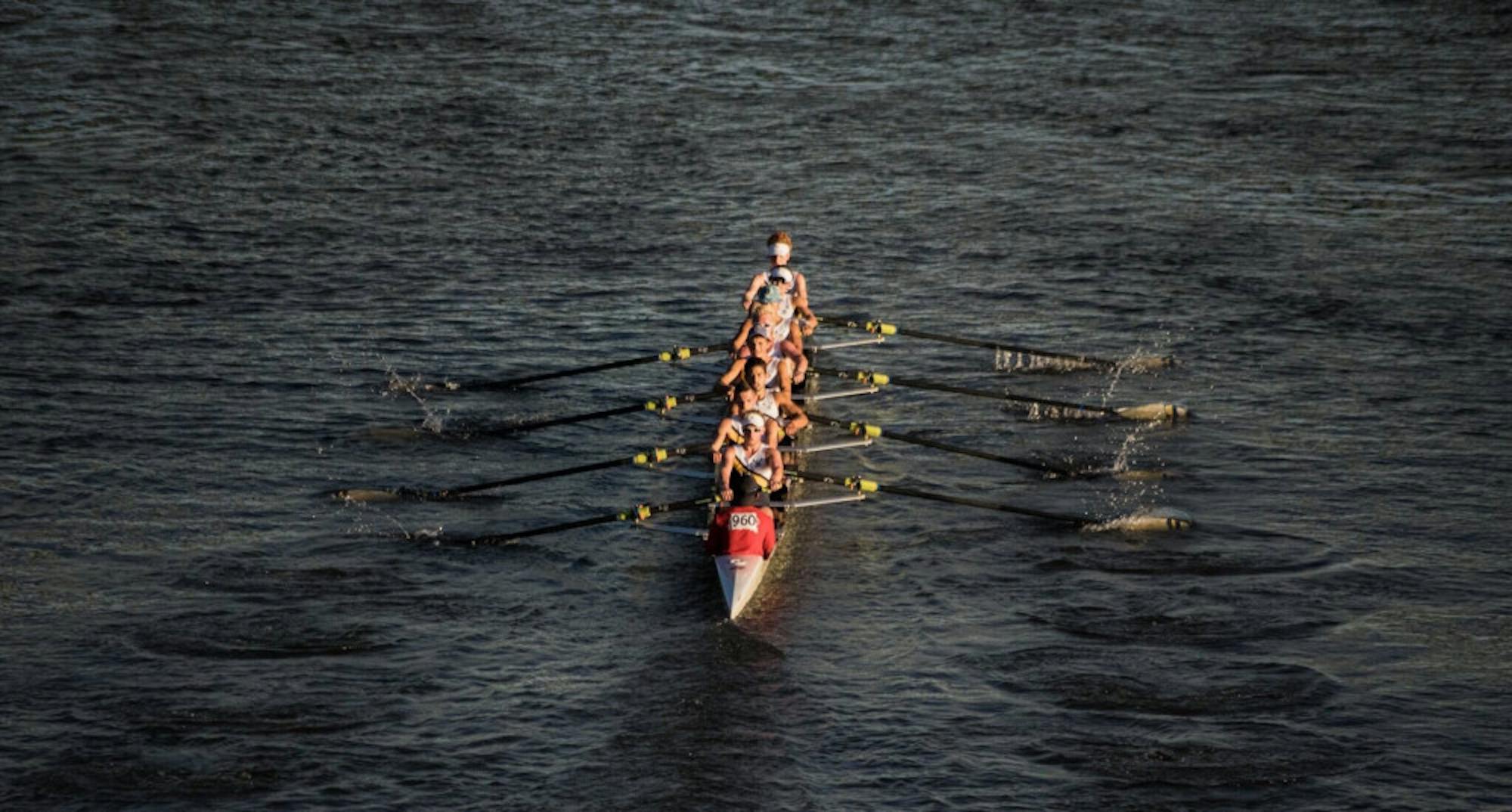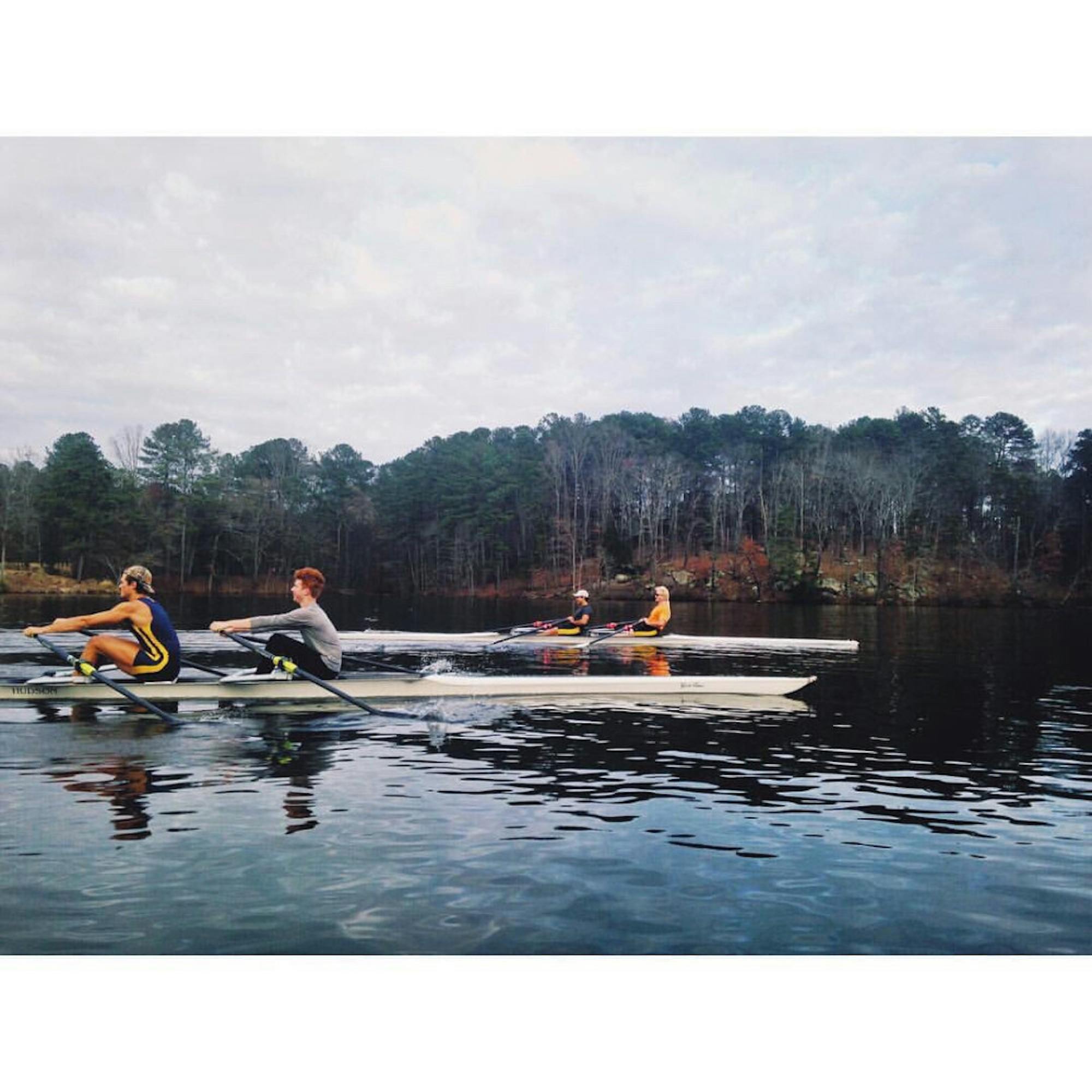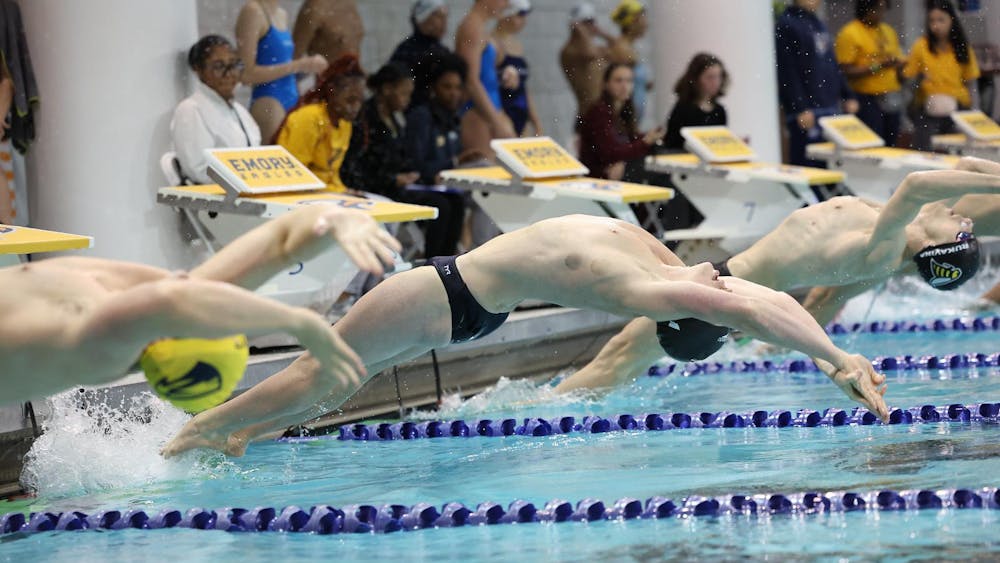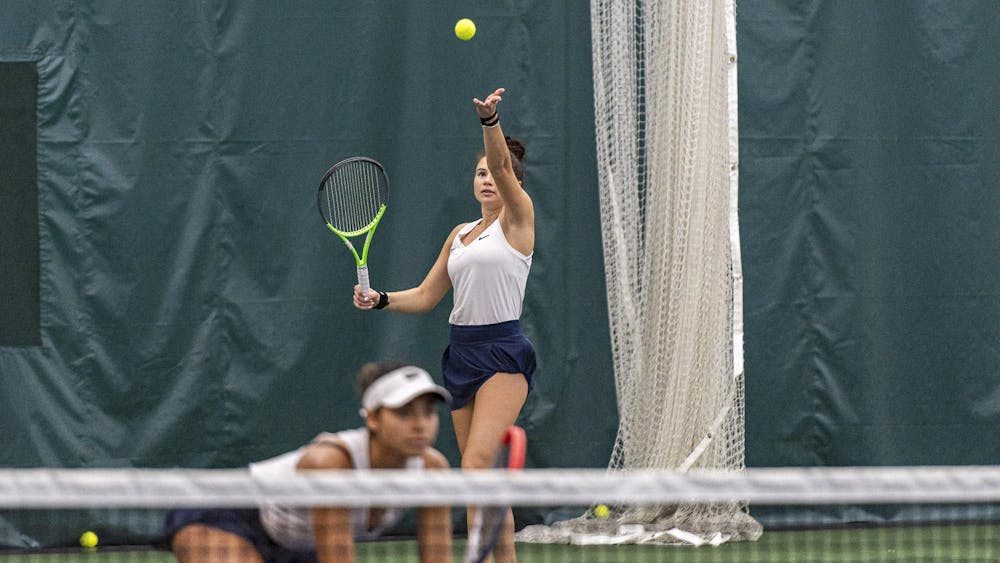
Back to front: Junior Mitchell Harmon, seniors Eliot Littlefield, Nick Leonard, Gunnar Wainwright, Adam Harrison Trent, Zhentian Shen, juniors Dean Tanioka, Paavali Hannikainen, and Peter Choi (16C) sweep in an eight. Courtesy Emory Crew.
Ask any club sports athlete why he or she participates on a team and you’re likely to hear something about why the experience is positive and, above all, fun. When that sport is crew, however, it can be difficult to see where the fun fits in with the stress of the exhaustive training crew demands. Yet for Emory’s Club Crew team, that stress seems to strengthen the bonds of those who stick through more than one practice.
At the club’s core is the will to win, but community is what holds the team together.
“The group of people that choose to do [crew] is one of the most competitive groups of people you could possibly find,” Emory Crew President and junior rower Mara Goeckner said. “It’s not regattas that [make] people want to stay, but the combination of the competitiveness and the community.”
The team is currently gearing up for its first race, the John Hunter Regatta at Lake Lanier, Ga., March 25. With destinations ranging from Sarasota, Fla. to Philadelphia, the team’s spring regatta schedule presents multiple opportunities for upper-level competition nationwide. At the Head of the South Regatta in Augusta, Ga., the team’s last meet of the Fall 2016 season, the women finished first in the collegiate and club 4+ category and the men claimed first in the championship 4+ category. With five regattas scheduled for the spring, the team hopes to build on that success.
“Once you go into a regatta, you realize that there is no division [amongst the teams] in club rowing,” Head Coach Eric Rusiecki said. “We go compete against Ohio State, Florida, FSU, Vanderbilt — there is really no school that we don’t compete against.”
According to Rusiecki, the chance to go head to head with some of the fastest competition is one of the team’s greatest motivators. With five regattas scheduled for the spring, Emory Crew has plenty of opportunities to prove just how fast they can really go.
“We are trying to make a name for ourselves,” Emory Crew Secretary and junior rower Joely House said. “This year [the goal] is not just making it to ‘A’ finals [the final heat] but medaling at these championship meets.”
Though she’s now team president, Goeckner had little crew experience prior to her time at Emory. She had learned about the sport while looking to fill the gap left from her days as a high school volleyball player. Her path to crew speaks to the attitude necessary to thrive in the highly competitive environment.
“Everybody on my freshman floor bet me and this other guy (who is no longer on the team) how long we could make it because everyone talks about how hard it is,” Goeckner said. “I went to practice — and out of stubbornness and wanting to prove them wrong — I kept going and here I am.”
The team’s camaraderie is such that, though newcomers may not initially plan to stick through the entirety of what often becomes a grueling season, the practices mold lasting relationships. House recalled how senior members of the team took her under their wing when she was a freshman.

Two doubles row together. Courtesy Emory Crew.
“I finally felt like I had found my place here,” House said. “They were such a welcoming squad. I hadn’t felt that sense of connection with any other club on campus.”
The men’s and women’s crew teams are separate entities within the same club, but it’s a division that exists more on paper than in reality.
“[Rusiecki] preaches ‘one team,’” House said. “We do get in [separate] boats but collectively we are one team … we practice at the same time, we race at the same races [and] this makes the team culture a lot stronger.”
Culture is frequently mentioned among members of Emory Crew. Rowing is hard work, but it’s that culture of hard work that keeps the oars turning.
“The culture is everything,” Rusiecki said. “You go harder because of everyone around you or you push yourself to another level because of the teammate sitting in front of you.”
Emory Crew’s list of alumni includes former Olympians. Cyrus Beasley (95C) competed in the 1996 Olympics, finishing No. 10 in the Men’s Single Sculls event. Sarah Hirst (99C) was Emory’s first female Olympian, an alternate for the Lightweight Double Sculls event at the 2004 Olympics.
Given their rich history and the foundation that the team now has, Emory Crew hopes to make more than just a splash among the rowing community.
The team’s alumni board plays a vital role in supporting current rowers. Between coordinating regattas and programs like Rent-a-Rower, which helps rowers cover the approximately $400 cost of club dues per semester, alumni are a key part of Emory Crew’s success. Current students have tremendous power to decide where the club will go and what the club becomes, but it’s the alumni whom enable the team to make those goals reality.
“One of the Olympians coming from Emory was a rower, so there is no way you can say well, you are just a club sport,” Rusiecki said. “Knowing that there is a tradition, that year-in, year-out we are one of the top teams — that’s something I would like more of Emory to know.”
Talk to an Emory Crew member and you may find yourself in the midst of a pitch to become the next coxswain (seriously, the team is looking for coxswains), because recruiting is a full-team effort. Set on medaling at the championship level, Emory Crew is eager to take the next step towards national recognition. That effort begins with recruiting, an unofficial process by which current members hope to attract Emory students to the team.
But even in those recruitment conversations, members won’t hide the fact that the long, repetitive practices can be rough. For Emory Crew members, those practices are simply part of what bonds the team. Thanks to the camaraderie of Emory Crew, the physical and mental demands of rowing simply become afterthoughts.





